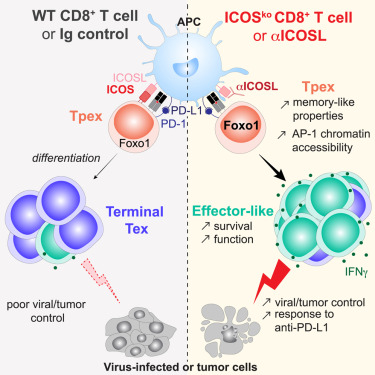The costimulatory molecule ICOS limits memory-like properties and function of exhausted PD-1(+)CD8(+) T cells.
During persistent antigen stimulation, CD8+ T cell responses are maintained by progenitor exhausted CD8+ T (Tpex) cells. Tpex cells respond to blockade of the inhibitory receptor programmed cell death-1 (PD-1), and regulation of their differentiation is critical for immunotherapies. Tpex cells highly express inducible costimulator (ICOS), but how ICOS modulates PD-1+CD8+ T cells is not clear. During chronic infection, intrinsic ICOS deficiency increased number and quality of virus-specific CD8+ T cells. Loss of ICOS potentiated activity of the transcription factor forkhead box O1 (FoxO1) and memory-like features of Tpex cells. ICOS-deficient Tpex cells were poised to generate effecor-like cells with improved survival and cytokine production. ICOS-ligand (ICOSL) blockade expanded effector-like PD-1+CD8+ T cells, reduced viral load, and improved response to PD-1 blockade. Similarly, in a mouse model of hepatocellular carcinoma, ICOS inhibition enhanced tumor-specific CD8+ T cell responses and tumor control by PD-1 blockade. Overall, we show that sustained ICOS costimulation limits CD8+ T cell responses during chronic antigen exposure.
Authors
Humblin E, Korpas I, Prokhnevska N, Vaidya A, Filipescu D, et al.
External link
Publication Year
Publication Journal
Associeted Project
Systems Immunology of Human Diseases
Lista de serviços
-
As antisense RNA gets intronic.As antisense RNA gets intronic.
-
Androgen responsive intronic non-coding RNAs.Androgen responsive intronic non-coding RNAs.
-
Conserved tissue expression signatures of intronic noncoding RNAs transcribed from human and mouse loci.Conserved tissue expression signatures of intronic noncoding RNAs transcribed from human and mouse loci.
-
The intronic long noncoding RNA ANRASSF1 recruits PRC2 to the RASSF1A promoter, reducing the expression of RASSF1A and increasing cell proliferation.The intronic long noncoding RNA ANRASSF1 recruits PRC2 to the RASSF1A promoter, reducing the expression of RASSF1A and increasing cell proliferation.
-
Antisense intronic non-coding RNA levels correlate to the degree of tumor differentiation in prostate cancer.Antisense intronic non-coding RNA levels correlate to the degree of tumor differentiation in prostate cancer.
-
Insight Into the Long Noncoding RNA and mRNA Coexpression Profile in the Human Blood Transcriptome Upon Leishmania infantum Infection.Insight Into the Long Noncoding RNA and mRNA Coexpression Profile in the Human Blood Transcriptome Upon Leishmania infantum Infection.
-
Long non-coding RNAs associated with infection and vaccine-induced immunityLong non-coding RNAs associated with infection and vaccine-induced immunity
-
Comparative transcriptomic analysis of long noncoding RNAs in Leishmania-infected human macrophagesComparative transcriptomic analysis of long noncoding RNAs in Leishmania-infected human macrophages
-
SARS-CoV-2 Selectively Induces the Expression of Unproductive Splicing Isoforms of Interferon, Class I MHC, and Splicing Machinery Genes.SARS-CoV-2 Selectively Induces the Expression of Unproductive Splicing Isoforms of Interferon, Class I MHC, and Splicing Machinery Genes.

